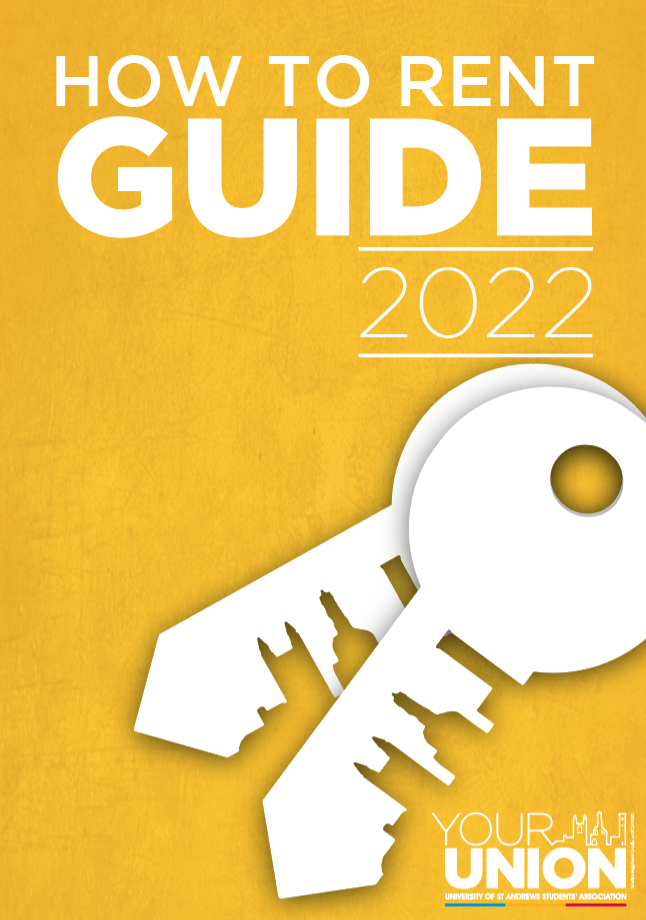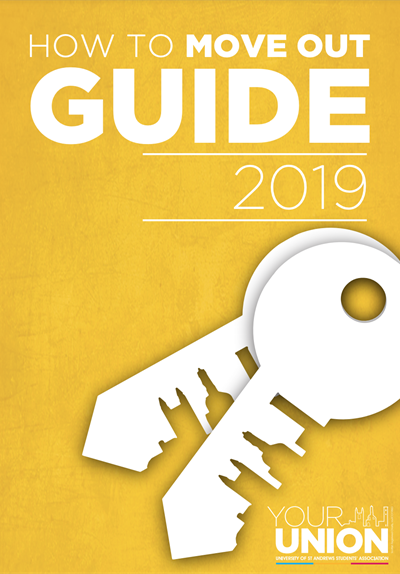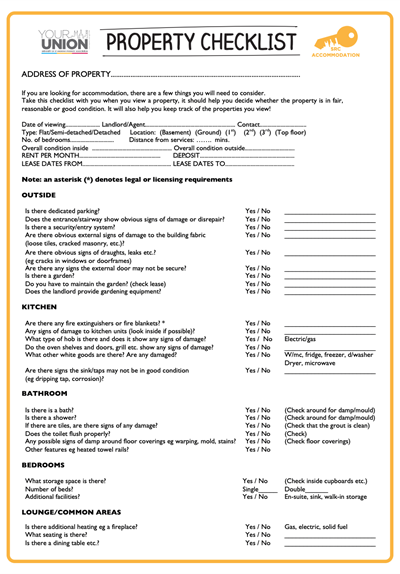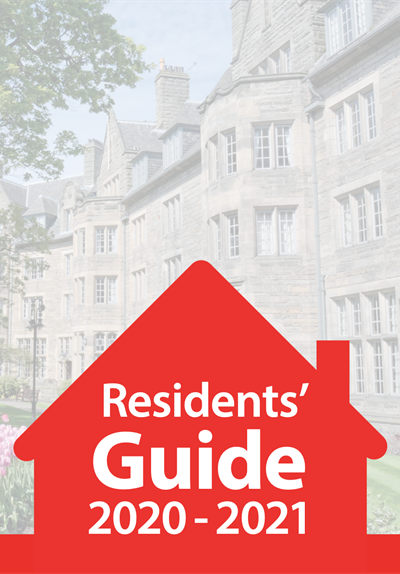Check our Accommodation Subcommittee for more housing info.
Introduction
This is our guide to help students navigate accommodation in St Andrews, whether staying in private or University-owned housing.
We represent students through the Accommodation Subcommittee, and our HR Manager.
One of the best places to find accommodation is through the Get a Room group. Spaces often open up throughout the year, as people drop out or postgrad students move house. Note that this group is not affiliated with the Students' Association.
Never pay a deposit without viewing a property. This is a common scam, which has been reported in St Andrews in recent years. Always check if a landlord is registered with Fife Council; if they aren't, the property is being rented illegally, even if the offer is genuine.
FAQs
When should I start looking for accommodation?
Letting agents function on a rolling basis. See the How to Rent Guide below for more information about local letting agents. You might consider finding a group of people you want to live with around December/January, to start planning paperwork together. It's best to decide what suits everyone's needs, in terms of price and location, before you return to St Andrews for semester two.
How do I decide who to live with?
You may have heard that your best friends aren’t always the best people to live with, and this is for a reason. However, this is far from a rule, and you'll never know exactly how compatible someone will be as a flatmate until you live with them.
If you know you’re a morning person, you might want to avoid living with people who are night owls. If you like a fairly calm, peaceful environment, you might want to avoid living with those who prefer hosting house parties. Be prepared to have a long conversation about likes, dislikes, and dividing up tasks with future housemates, and establish good communication as soon as possible.
The Accommodation Subcommittee has previously held Flatmate Matchmaking sessions, so like their Facebook page to keep up with future events.
What do I need when applying for private accommodation?
Every letting agency and private landlord is different, but you can expect to need the following documents:
- Application form provided by the letting agency
- Scan of your matriculation card
- Scan of your driving licence or passport (depending on nationality)
- Character reference
- Reference from previous landlord
- Proof of address and/or study
- Guarantor form
It's best to prepare as many of these documents as possible over winter break, especially if you're an international student.
Check the How to Rent Guide for a full breakdown of which forms are required by each letting agency.
What if I'm staying outside St Andrews?
The Lifers subcommittee offers support if you're staying outside St Andrews and commuting in to study (including if you're in University-managed accommodation like Old Mill).
Contact
For general issues, contact the Student Accommodation Officer: SRCaccommodation@. Their committee can help students with individual cases, providing advice relating to landlords, letting agents, saving money, and more.
For independent, confidential, and non-directive advice, contact our HR Manager via HelpHub@. They can check your lease, advise on your rights, and help disputes with landlords, flatmates, or neighbours.
Lease checking
Our HR Manager can look through your lease to check it's legal and up to date. To use this service, send a copy of your tenancy agreement to HelpHub@.
Lease checking terms and conditions
- This service is provided by the St Andrews Students’ Association ("the Association"), only to current or prospective students of the University of St Andrews only (hereinafter referred to as "clients" of the service).
- The service is offered only in relation to properties let in Scotland for the purposes of accommodation while engaged in study on a course at the University of St Andrews.
- The service consists of reading a draft or final copy of a lease proposed by the prospective landlord or agent, explaining terms and conditions therein, and suggesting points that the client may wish to discuss with the prospective landlord or agent. Such suggestions may refer to requirements of relevant legislation and associated guidance, principally the Private Housing (Tenancies) (Scotland) Act 2016 and government-published guides to this act.
- The service is provided on a good faith basis with reasonable skill and care, but it is not professional legal advice that clients can rely on. Clients are advised to take appropriate professional legal advice on any matters that they are not comfortable with.
- The Association will ensure that this service is only offered by appropriately trained staff. No other staff or volunteer may offer comment on a lease. Appropriately trained in this case denotes successful completion of a course such as Shelter Scotland/Scottish Government Private Residential Tenancy training, or equivalent.
- The Association will not, under any circumstances, direct a client to sign or not to sign a lease.
- The Association shall not enter into direct contact with the landlord or their agent, nor any associated regulatory bodies such as Fife Council, concerning the lease. All such communications and the decision on whether to enter into them are, and remain, the sole responsibility of the client.
- Comments are made on the lease as presented by the client, and any additional information supplied by the client about the property etc. The Association accepts no responsibility for changes made to the lease after the consultation, material facts that were not disclosed during the consultation, or erroneous information supplied by the client.
Property viewing
Contact HelpHub@ to use our private accommodation viewing service (PAVS).
The service is suspended until 19 July.
You should always view a flat personally if you can. There’s no substitute for seeing the place you’re going to live in person. However, sometimes this might not be possible; for example, students or prospective students who are not in the UK often can’t make a trip just to view a flat.
In these cases, we may be able to view a flat on your behalf, and provide a report on the physical aspects of the property.
Property viewing terms and conditions
- This service is provided by the St Andrews Students’ Association ("the Association"), only to current or prospective students of the University of St Andrews only (hereinafter referred to as "clients" of the service).
- The service is limited to visiting each property for which a visit is requested on one occasion, and reporting back the results of that visit to the client.
- Clients will be sent a confirmation by email if a representative is available to view the property at the proposed time. Appointments are not valid until confirmed.
- Clients must be aware that from time to time, due to shortage of representatives, the Association may not be able to fulfil a PAVS request or may have to cancel a request. We will always endeavour to notify clients in advance where this will be the case.
- Properties to be viewed must be in St Andrews or within a 10 mile distance of St Andrews by road. Properties outside St Andrews may require additional notice, and are subject to the availability of a representative who is able to travel.
- Normally, clients will be expected to assume responsibility for contacting and communicating with the landlord or agent. The only exception to this will be where the landlord or agent requests direct contact with the Association to arrange a viewing time, or in the case of a viewing time having to be cancelled or rearranged at short notice.
- The report will be sent by email only.
- The report will cover physical aspects of the property as observed at that viewing only. PAVS reports will make no comment as to the affordability or suitability of a property for the client concerned, these matters being for the clients to judge for themselves.
- PAVS viewings will not incorporate checks on electrical safety, gas safety, fire safety, or other matters that are the responsibility of the landlord to ensure under the relevant legislation, e.g. PAT testing. Clients should verify these with the landlord directly.
- Any decision to proceed or not to proceed with letting a property rests solely with the client, and the Association will not advise a client on this decision.
- The St Andrews Students’ Association accepts no responsibility for defects or problems in the property that could not reasonably have been observed during the visit, or for any restrictions put in place by the landlord or agent that may hinder the process of viewing.
Marks Out Of Tenancy
The private renting market in St Andrews is highly competitive, making it easy for poor housing conditions to go unchallenged. Students need to approach the market with knowledge of their rights and responsibilities as a tenant.
That's why we have partnered with Marks Out Of Tenancy, a platform for sharing experiences and creating transparency about living conditions.
Their website lets tenants leave reviews of landlords and properties, allowing prospective tenants to make informed decisions, and rewarding the best landlords and letting agents.
If you have recently moved out of a rented propery, leave a review!
Guides



![]()

We have an Online Student Safety Guide from Police Scotland available too.
Rent Freeze and Eviction Ban
The Scottish government have recently passed the Cost of Living (Tenant Protection) (Scotland) Bill, which contains measures to protect private sector tenants during the cost of living crisis. This is split into two main areas: a rent cap and protection from evictions.
Rent freeze: The Bill says that private landlords can’t increase the rent you pay until at least 31 March 2023. Landlords have to send you a rent increase notice to increase your rent: the bill makes any such notice issued invalid if it was issued on or after 6 September 2022 (for tenants with a Private Residential Tenancy) or 6 October 2022 (for students in purpose built student accommodation, including halls). If you have received a notice after that date, you can ignore it.
However, landlords can still ask for permission to increase your rent in certain circumstances during this period. This would include increases to their costs, including increases to service charges included in your rent, and increased mortgage payments. There is a limit to how much they can increase the rent in these cases and they must get permission first, so seek advice from [email protected] if your landlord tells you they intend to do this. You can also seek advice if the landlord tries to enforce an invalid rent increase notice.
The other major exception is ‘common law’ tenancies, which include situations where you live as a lodger with a resident landlord. These landlords can still increase rent as normal.
Eviction ban: Your landlord can still serve notice of eviction and seek permission to evict you. The law only says that evictions can’t be enforced until 31st March 2023. This means you can’t actually be made to leave the property until that time, but the landlord can still start the process, so that they can enforce the eviction immediately after the ban period ends.
Again, there are exceptions in the Bill. For example, your landlord can still make you leave if:
- they need the property to live in themselves, or
- the property is repossessed by the bank, or
- the eviction is due to criminal or anti-social behaviour, or
- you owe six months’ rent.
The Scottish government have given themselves the power to extend these measures by three months after the end of March 2023. This might mean a freeze or rent increase cap continues for the rest of the academic year, and the eviction ban too. The Students’ Association will monitor this situation and release information for students when we know more.